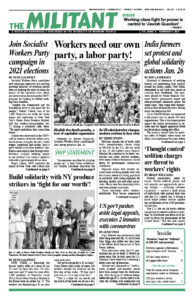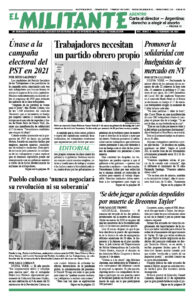Federal prosecutors, aided by bosses, liberal political groups and tech moguls, are aggressively pursuing charges — including seditious conspiracy — against a small group of individuals who pushed their way into the U.S. Capitol Jan. 6 during a much larger protest outside against the certification of the 2020 presidential election.
The U.S. law on the books defines conspiring to commit sedition as plotting “to overthrow, put down or to destroy by force the government of the United States.” But this and similar laws, as U.S. history shows, have been used to assault political rights and attack the labor movement. They’re a danger to the working class.
In 1798, a few years after the American Revolution against British colonial rule, the Federalist Party administration of President John Adams pushed through the Alien and Sedition Acts. These attacks on political rights were aimed at increasing federal power, going after those sympathetic to the French Revolution and the French government’s challenges to Washington’s new navy.
The Sedition Act made it a crime to criticize the president or the government of the United States. Thomas Cooper, a newspaper editor in Sunbury, Pennsylvania, was indicted, convicted, fined and thrown in jail for six months for publishing an article critical of President Adams. The Alien Act gave the president the power to deport without trial French immigrants and other foreigners deemed “dangerous to the peace and safety of the United States.”
Sedition charges were used against abolitionists and others speaking out against the slavocracy. In 1832, after Nat Turner led a rebellion of slaves, the state of Virginia passed a law against “riots, routs, unlawful assemblies, trespasses and seditious speeches by free Negroes or mulattos,” who would be publicly whipped just like rebellious slaves.
In May 1918, as the U.S. rulers had entered the first imperialist world war to advance their interests, Congress again passed a Sedition Act. This law, along with the Espionage Act enacted the previous year, was aimed at silencing those who spoke out against the war. The Sedition Act made it a crime for anyone who made statements against the war or published “any disloyal, profane, scurrilous or abusive language about” the U.S. government. Those found guilty faced fines up to $10,000 and imprisonment for up to 20 years.
The postmaster general used the law to ban delivery of publications like The Masses and The Nation.
Eugene V. Debs, a rail labor organizer and four-time presidential candidate of the Socialist Party, was arrested and sentenced to 10 years in prison for making an anti-war speech in June 1918 in Canton, Ohio. He ran as the SP presidential candidate again from prison in 1920, winning almost a million votes.
During and after the war, the Russian Revolution inspired workers in the U.S. and around the world. President Woodrow Wilson appointed A. Mitchell Palmer as attorney general and tasked him and the newly formed Bureau of Investigation with using the Sedition Act to go after the labor and new-born communist movements. They organized raids on union halls and political headquarters, arresting some 10,000 people, breaking up the founding convention of the Communist Party, and more in what became known as the Palmer Raids.
In 1941, as the U.S. rulers were gearing up to enter the second imperialist world war, 18 leaders of Teamsters Local 544 and of the Socialist Workers Party were framed up and convicted under the newly passed Smith Act on “conspiracy” charges that made the advocacy of ideas a federal crime.
These working-class fighters were being targeted by the federal government for building a trade-union campaign against President Franklin Roosevelt’s course toward entry into World War II and for refusing to abandon the struggle to improve working conditions and build and strengthen unions.
The Department of Justice handed down indictments on July 15, 1941. The conspiracy, the government said, included advocating overthrow of the government by force and publishing and circulating literature advocating this. All 18 were convicted under the Smith Act. They were sentenced to between 12 and 16 months in prison.
The Stalinist Communist Party, which backed the imperialist war, supported and aided in the federal prosecution of the defendants. In 1949, 11 CP leaders were indicted and jailed for violating this same thought-control law. “CP Trial Verdict Hits Rights of All” headlined the Oct. 24 Militant that year, as the socialist newsweekly campaigned against this attack on workers’ rights.
In 1973 the SWP filed a landmark federal lawsuit challenging decades of FBI spying, harassment and disruption and waged a 13-year political campaign around it. The party won a powerful decision defending the SWP’s right to its revolutionary views, free from government interference.
Regardless of who is arrested today on charges of seditious conspiracy, the ruling families’ real target is the working class and its vanguard.

